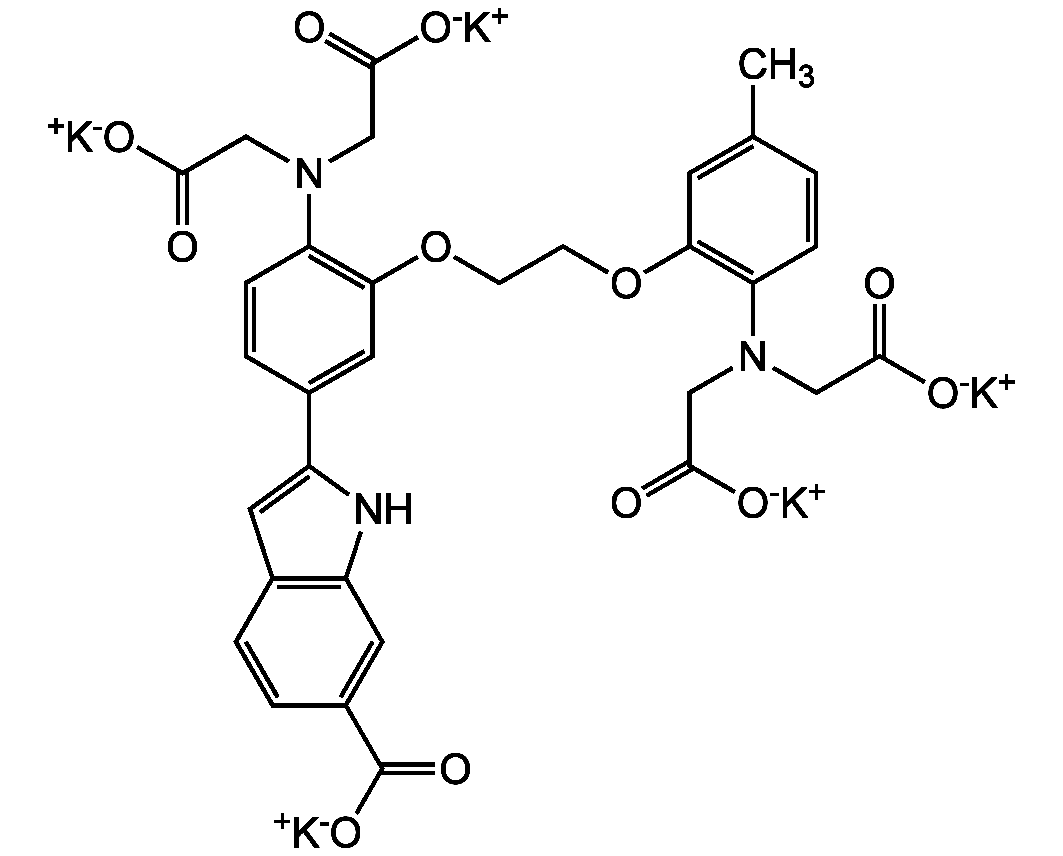
Chemical Structure
Indo 1-AM [112926-02-0] [112926-02-0]
CDX-I0019
CAS Number112926-02-0
Product group Chemicals
Estimated Purity>90%
Molecular Weight1009.93
Overview
- SupplierChemodex
- Product NameIndo 1-AM [112926-02-0] [112926-02-0]
- Delivery Days Customer2
- CAS Number112926-02-0
- CertificationResearch Use Only
- Estimated Purity>90%
- Molecular FormulaC47H51N3O22
- Molecular Weight1009.93
- Scientific DescriptionChemical. CAS: 112926-02-0. Formula: C47H51N3O22. MW: 1009.93. Synthetic. INDO 1-AM is a popular non-invasive UV-excitable calcium indicator. It is the cell-permeable ester derivative of INDO 1. After crossing the cell membrane, INDO 1-AM is rapidly hydrolyzed by cytoplasmic esterases to produce the ratiometric fluorescent calcium indicator INDO 1, which remains trapped within the cell. INDO 1/AM has been used to selectively monitor Ca2+ levels in mitochondria and in the cytosol. INDO 1 is ideal for analyses using flow cytometry, as it uses a single excitation source (usually the 351-364nm spectral lines of the argon-ion laser). In contrast to FURA 1, INDO 1 has a dual emission peak. The emission of INDO 1 shifts to 400nm (when bound to Ca2+) from 480nm in Ca2+-free environments. INDO 1 is prone to photobleaching, which limits its usefulness in methods involving microscopy. Calcium measurement is critical for numerous biological investigations. Fluorescent probes that show spectral responses upon binding Ca2+ have enabled researchers to investigate changes in intracellular free Ca2+ concentrations by using fluorescence microscopy, flow cytometry, fluorescence spectroscopy and fluorescence microplate readers. Spectral Data: lambdaex 330nm; lambdaem 450nm (with Calcium), lambdaex 356nm; lambdaem 478nm in methanol. - INDO 1-AM is a popular non-invasive UV-excitable calcium indicator. It is the cell-permeable ester derivative of INDO 1. After crossing the cell membrane, INDO 1-AM is rapidly hydrolyzed by cytoplasmic esterases to produce the ratiometric fluorescent calcium indicator INDO 1, which remains trapped within the cell. INDO 1/AM has been used to selectively monitor Ca2+ levels in mitochondria and in the cytosol. INDO 1 is ideal for analyses using flow cytometry, as it uses a single excitation source (usually the 351-364nm spectral lines of the argon-ion laser). In contrast to FURA 1, INDO 1 has a dual emission peak. The emission of INDO 1 shifts to 400nm (when bound to Ca2+) from 480nm in Ca2+-free environments. INDO 1 is prone to photobleaching, which limits its usefulness in methods involving microscopy. Calcium measurement is critical for numerous biological investigations. Fluorescent probes that show spectral responses upon binding Ca2+ have enabled researchers to investigate changes in intracellular free Ca2+ concentrations by using fluorescence microscopy, flow cytometry, fluorescence spectroscopy and fluorescence microplate readers. Spectral Data: lambdaex 330nm; lambdaem 450nm (with Calcium), lambdaex 356nm; lambdaem 478nm in methanol.
- SMILESCC1=CC(OCCOC2=CC(C3=CC(C=CC(C(OCOC(C)=O)=O)=C4)=C4N3)=CC=C2N(CC(OCOC(C)=O)=O)CC(OCOC(C)=O)=O)=C(N(CC(OCOC(C)=O)=O)CC(OCOC(C)=O)=O)C=C1
- Storage Instruction-20°C
- UNSPSC12162000


![Indo-1 AM [112926-02-0] [112926-02-0]](https://www.targetmol.com/group3/M00/35/85/CgoaEWayIzeEKBpUAAAAABYmEvc828.png)